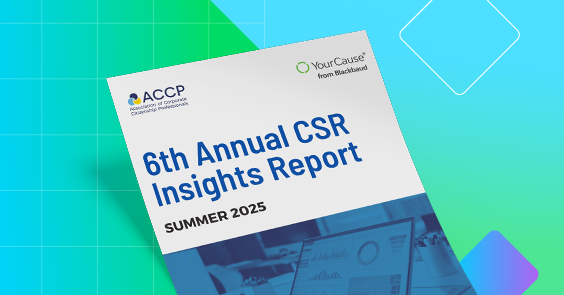Digging Deeper into the 6th Annual CSR Survey

As corporate social impact continues to evolve under the weight of political shifts, economic uncertainty, and rising stakeholder expectations, our 6th Annual CSR Insights Report, in partnership with ACCP, offers a timely snapshot of a field in flux. This survey data comes from CSR teams across 135 companies, representing approximately $1 billion in community investment.
Below, we’ll note some of the key insights highlighted in the report. But beyond the headlines, there’s a deeper narrative unfolding. This blog also unpacks the complex movements shaping the future of CSR. From the quiet transformation of grantmaking strategies to the subtle rebranding of DEI language, we explore developments in the corporate impact space and what it means for CSR professionals navigating 2025 and beyond.
High Level Insights from the Report
-
Increased Need to Make the Business Case: CSR teams are under growing pressure to demonstrate how their work drives business value, not just social impact.
-
Companies Are Shifting Priority Issue Areas: Firms are moving investments toward less politically sensitive areas like STEM and workforce development, while reducing focus on racial equity and gender equality.
-
AI Is Reshaping Corporate Social Impact Work: 73% of CSR teams now use AI to boost productivity, storytelling, and data analysis, marking a major leap in tech adoption.
-
Shifts in Budget Allocation Reflect Strategic Priorities: Budgets for employee engagement and foundations are increasing, signaling a focus on internal impact and formal grantmaking.
-
Political Pressures Are Reshaping DEI Integration in CSR: Legal scrutiny and political climate are prompting companies to scale back public DEI efforts and change how they communicate about them.
-
Expanding Responsibilities, Growing Recognition: Despite heavier workloads, CSR professionals are gaining visibility, influence, and career growth within their organizations.
Beyond the Headlines: The Forces Shaping CSR in 2025
1. CSR Is Driving Strategic Talent Development
While the shift away from racial equity and gender equality as top causes is notable, the powerful trend in the other direction is the increasing alignment of CSR with talent strategy. The rise in community investments in areas like K–12 education, and workforce development, which were the top two priority cause areas at 43% each, reinforces companies’ desire to support the talent pipeline. Similarly, STEM was a priority cause for 35% of companies, a 3% increase from last year. Businesses are clearly using CSR to future-proof their workforce.
2. The Language of Impact Is Changing Fast
The report shows a sharp decline in the use of terms like “DEI” (54% have decreased usage) and “ESG” (34% using the term less) in public communications. In the same vein, 71% of respondents said they are changing the language used to communicate about DEI efforts. This isn’t just semantics, but a deliberate pivot.
CSR teams are rebranding their efforts to navigate political scrutiny while preserving core values. The linguistic shift reflects broader programmatic trends for some businesses as well, with 14% of respondents having paused or ended DEI initiatives altogether and 18% having shifted the types of DEI-related programs they support. Companies are reframing and rethinking their social impact and DEI narratives to maintain stakeholder trust while adjusting to the environment.
3. Grantmaking Is Becoming More Thoughtful
While grant budgets have not increased this year, 25% of companies said they are moving away from small grants in favor of larger, more strategic ones. There’s also a clear move towards multi-year funding (14%), general operating support (14%), and capacity-building (13%), which are hallmarks of trust-based philanthropy. This signals a maturing approach to nonprofit partnerships, where depth and sustainability matter more than breadth and volume.

At the same time, companies are increasing their focus on supporting local communities, which would align with more of a place-based approach, as well as employee selected grants, which reinforces the value of the employee voice in community impact decisions.
4. AI Is No Longer Experimental, But Essential
Artificial intelligence has officially moved from the margins to the mainstream in CSR. According to the report, 73% of CSR teams now use AI tools, with the most common applications being storytelling (72%), productivity (64%), and data analysis (37%). These tools are helping teams communicate impact more effectively, streamline reporting, and scale their efforts.
CSR teams are expected to do more with less. AI is becoming a strategic enabler, allowing lean teams to meet rising expectations without proportional increases in headcount or budget. It’s also helping CSR professionals make the business case for their work by providing clearer data and more compelling narratives.
5. CSR Teams Are Gaining Responsibility
For the first time in three years, a majority of CSR professionals (53%) report having the resources, staff, budget, and expertise to meet the demands of their roles. This marks a meaningful shift from 2024, when only 38% felt adequately equipped. While gaps remain, especially in headcount and executive alignment, the data suggests that strategic investments and operational focus are beginning to close the resource gap.

At the same time, 72% of CSR teams say their scope of work has expanded, and 62% report increased visibility within their organizations. This dual trend of rising responsibility and growing recognition signals a turning point: CSR is no longer a support function but now a strategic pillar for business performance, employee engagement, and brand trust.
To get all the insights and data, download the full report here.



